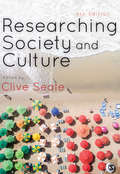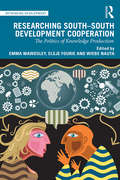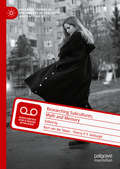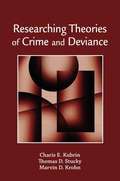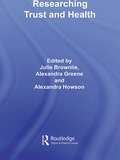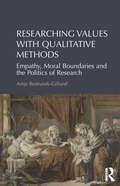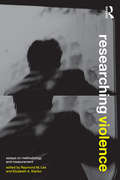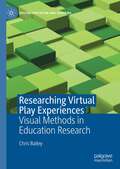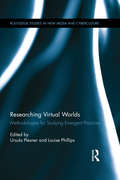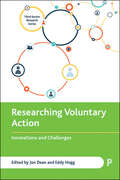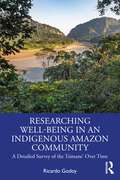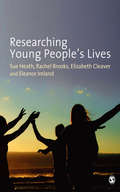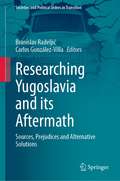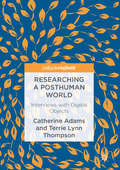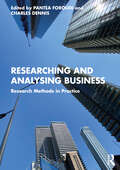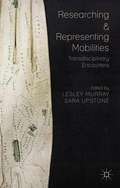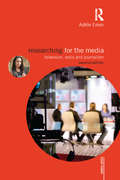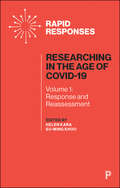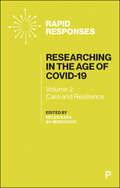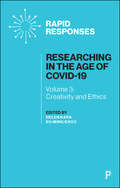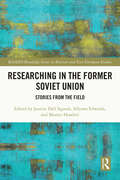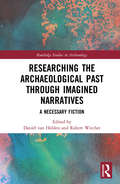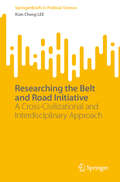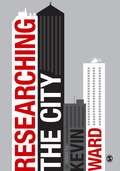- Table View
- List View
Researching Society and Culture
by Clive SealeWritten by internationally renowned experts, each chapter provides a full introduction to a key aspect of research methodology. From starting out to generating, analysing, and presenting data, this new edition covers foundational concepts in social research while also keeping students on the pulse of topics like digital social research, social surveys, and big data. Packed with international examples from across the social sciences, it shows how to interpret and work with data generated from real-world research. It gives you the tools to: - Design the right research question for your project - Access, understand, and use existing data - Effectively write up projects and assignments - Be confident in the A to Z of the research process Supported by an interactive website with videos, datasets, templates, and additional exercises, this book is the perfect hand-holder for any social science student starting a methods course or project.
Researching South-South Development Cooperation: The Politics of Knowledge Production (Rethinking Development)
by Emma Mawdsley Elsje Fourie Wiebe NautaOver the last two decades the expanding role of Southern countries as development partners has led to tectonic shifts in global development ideas, practices, norms and actors. Researchers are faced with new questions around identity, power and positionality in global development. Researching South-South Development Cooperation examines this rapidly growing and complex phenomenon, asking to what extent existing assumptions, conceptual frameworks and definitions of 'development' need to be reframed in the context of researching this new landscape. This interdisciplinary book draws on voices from across the Global South and North to explore the epistemological and related methodological challenges and opportunities associated with researching South-South development cooperation, asking what these trends mean for the politics of knowledge production. Chapters are interspersed with shorter vignettes, which aim to share examples from first-hand participation in and observation of South-South development cooperation initiatives. This book will be of interest to anyone conducting research on development in the Global South, whether they are a practitioner or policy maker, or a student or researcher in politics, international development, area studies, or international relations.
Researching Subcultures, Myth and Memory (Palgrave Studies in the History of Subcultures and Popular Music)
by Bart van der Steen Thierry P. F. VerburghThis book brings together contributions that analyse how subcultural myths develop and how they can be studied. Through critical engagement with (history) writing and other sources on subcultures by contemporaries, veterans, popular media and researchers, it aims to establish: how stories and histories of subcultures emerge and become canonized through the process of mythification; which developments and actors are crucial in this process; and finally how researchers like historians, sociologists, and anthropologists should deal with these myths and myth-making processes. By considering these issues and questions in relation to mythmaking, this book provides new insights on how to research the identity, history, and cultural memory of youth subcultures.
Researching Theories Of Crime And Deviance
by Marvin D. Krohn Charis E. Kubrin Thomas D. StuckyMany textbooks provide summaries and critiques of criminological theories, which are often supported by empirical evidence. However, this evidence is only as good as the research methods that were used to generate it. Where do these "facts" come from, and how reliable are they? <p><p> Researching Theories of Crime and Deviance offers a critical evaluation of the research methods that generate data, bridging the gap between theory and research in the study of crime and deviant behavior. This unique resource challenges students to carefully appraise--rather than blindly accept--the research techniques that are used to produce theories and scholarship. <p> In clear and engaging language, noted criminologists Charis E. Kubrin, Thomas D. Stucky, and Marvin D. Krohn assess the various research methods that have been used to test nine theoretical perspectives of crime. As they examine the processes and challenges of conducting theoretically directed research, the authors focus on sampling, measurement, and analytical issues. <p> A dynamic and compelling text, Researching Theories of Crime and Deviance demystifies the research process, encouraging students to become better informed readers and researchers. It serves as an excellent resource for criminological theory courses, graduate-level research methods courses, and seminars that take a close look at the development of criminological theory and/or methods.
Researching Trust and Health (Routledge Studies in Health and Social Welfare)
by Alexandra Howson Julie Brownlie Alexandra GreeneThere is currently a lively debate ongoing in society about the nature of trust and the conditions necessary to establish and sustain it. Given the role of trust in bridging uncertainty, it is perhaps not surprising that as our consciousness of risk has increased, the role and nature of trust in social practices has come under growing scrutiny. These developments are particularly relevant to health because participation in health practices is arguably based on and engendered through trust. There is thus a need for empirically based research, which intelligently unravels this complexity to support all stakeholders in the health arena. This multidisciplinary volume of work addresses this gap by contributing substantively to the exploration of trust in the experience, practice and organization of health. It offers an overview of recent scholarship, based on empirical research, which explores the significance of trust in relation to key health-related issues. At the same time, this text examines conceptual themes in relation to trust more generally, including the relationship between trust and auditing, consent, expert knowledges and social capital.
Researching Values with Qualitative Methods: Empathy, Moral Boundaries and the Politics of Research
by Antje Bednarek-GillandIn several branches of social science, interest in values and moral evaluations has increased in recent years, with group values taking centre-stage, yet a satisfactory, theoretical account of the concept of values and their role in social life remains lacking. Engaging with theories of value formation and the role of values in everyday life found in ethics, classical sociology and contemporary social theory and their implications for empirical work, Researching Values with Qualitative Methods argues for a pragmatist approach both to understanding values and the manner in which they are formed, as well as exploring the ways in which they can be studied empirically, using qualitative research methods. In this way, this book promises to resolve many of the practical problems involved in fieldwork with political groups, including the prominent question of how to account for the researcher's own values. Illustrated with examples from published as well as new research, this book provides the foundation for the theoretical understanding of values and their empirical investigation, thus strengthening the connection between social theory and the development of research methods. As such, it will be of interest to sociologists, anthropologists and geographers with interests in values, social theory and research methodology.
Researching Violence: Methodology and Measurement
by Elizabeth A. Stanko Raymond M. LeeViolence is a research topic that is fraught with difficulties. A notoriously sensitive subject, and one that is presumed to be largely hidden, researchers have long struggled with the question of how to measure its impact and how to explore its incidence. Arising from the ESRC's Violence Research Programme, Researching Violence is a practical guide both to theses problems and to the obstacles encountered when negotiating this uneasy terrain. Comprising the reflections of researchers who have worked on diverse projects - from violence in the home to racial violence and homicide - this book demonstrates the ingenuity and at times courageous actions of researchers having to think on their feet. It also investigates the ethical and emotional issues arising from working with the victims and perpetrators of violence. This book will be indispensable for students and academics doing research projects on violence.
Researching Virtual Play Experiences: Visual Methods in Education Research (Digital Education and Learning)
by Chris BaileyThis book illuminates the lived experience of a group of primary school children engaged in virtual world play during a year-long after-school club. Shaped by post-structuralist theory and New Literacy Studies, it outlines a playful, participatory and emergent methodological approach, referred to as ‘rhizomic ethnography’. This ‘hybrid’ text uses both words and images to describe the fieldsite and the methodology, demonstrating how children’s creation of a digital community through Minecraft was shaped by the both the game and their wider social and cultural experiences. Through the exploration of various dimensions of the club, including visual and soundscape data, the author demonstrates the ‘emergent dimension of play’. It will be of interest and value to researchers of children’s play, as well as those who explore visual methods and design multimodal research outputs.
Researching Virtual Worlds: Methodologies for Studying Emergent Practices (Routledge Studies in New Media and Cyberculture)
by Louise Phillips Ursula PlesnerThis volume presents a wide range of methodological strategies that are designed to take into account the complex, emergent, and continually shifting character of virtual worlds. It interrogates how virtual worlds emerge as objects of study through the development and application of various methodological strategies. Virtual worlds are not considered objects that exist as entities with fixed attributes independent of our continuous engagement with them and interpretation of them. Instead, they are conceived of as complex ensembles of technology, humans, symbols, discourses, and economic structures, ensembles that emerge in ongoing practices and specific situations. A broad spectrum of perspectives and methodologies is presented: Actor-Network-Theory and post-Actor-Network-Theory, performativity theory, ethnography, discourse analysis, Sense-Making Methodology, visual ethnography, multi-sited ethnography, and Social Network Analysis.
Researching Voluntary Action: Innovations and Challenges (Third Sector Research)
by Jon Dean and Eddy HoggThe first book of its kind, this volume brings together a range of experts to review key methodological issues in the study of voluntary action, charitable behaviour and participation in voluntary organisations. Using case studies from around the world – from ethnography to media analysis and surveys to peer research – chapters illustrate the challenges of researching altruistic actions and our conceptualisations of them. Across different fields and methods, authors unpick the methodological innovations and challenges in their own research to help guide future study. Demystifying research and deepening our ability to understand the role of the third sector, this accessible book is suitable for social researchers at all levels.
Researching Well-Being in an Indigenous Amazon Community: A Detailed Survey of the Tsimane' Over Time
by Ricardo GodoyThis book aims to provide the first comprehensive, multi‑year, systematic, quantitative assessment in the behavioral sciences of how well‑being changes over time in a small‑scale rural society of Indigenous People in the Global South.Using data compiled by the Tsimane’ Amazonian Panel Study (2002–010) that monitored change in Tsimane’ communities, this book analyzes economic, social, and health changes in a farming and foraging society of native Amazonians in Bolivia. It uses multidisciplinary methods to follow the same individuals, households, and village through time and bring together three themes: well‑eing, economic inequalities, and the fate of Indigenous People in small‑cale rural societies of the Global South. It finds considerable material deprivation, high economic inequalities within Tsimane’ society, and declining standards of living over time It ends by asking “Is this evidence that people adjust to anything or are these the costs Tsimane’ pay to retain autonomy and follow a historical lifestyle?”This book aims to provide a comprehensive approach to the measurement of well‑being and how to track its changes, providing a platform for future generations to gauge long‑term change. It will resonate with undergraduate and graduate students across the behavioral sciences, professional anthropologists who specialize in the Amazon or well‑being, development economists, and senior researchers who are part of the wave of emerging interest in doing research in small‑scale rural societies of the Global South.
Researching Young People′s Lives
by Elizabeth Cleaver Eleanor Ireland Rachel Brooks Sue Heath′Researching young people′s lives will be useful to both the novice researcher and anyone interested in learning about new methods of practice′ - Youth Studies Australia Researching Young People′s Lives provides an overview of some of the key methodological challenges facing youth researchers and an introduction to the broad repertoire of methods used in youth-orientated research. The book is split into two sections. In the first half of the book, the authors consider the broad methodological and contextual concerns of relevance to the design and conduct of youth research, including ethical issues, the importance of context, and the rise of participatory approaches to youth research. The second part of the book focuses on the use of specific research methods in the conduct of youth research, ranging from surveys and secondary analysis through to interviewing, ethnography, visual methods, and the use of the internet in youth research. Throughout the book, the emphasis is on research in practice, and examples are drawn from recent youth research projects from a wide range of disciplines and substantive areas, and from a range of both UK and non-UK contexts. This is an ideal introduction to the field for novice researchers, in particular students studying and researching in the broad area of youth studies. It should also appeal to practitioners engaged in evaluation of service provision to young people, and to established youth researchers who might wish to explore the potential of using a different set of methods to those with which they are already familiar.
Researching Yugoslavia and its Aftermath: Sources, Prejudices and Alternative Solutions (Societies and Political Orders in Transition)
by Branislav Radeljić Carlos González-VillaIn Researching Yugoslavia and its Aftermath, a common thread is the authors’ path through the time and space context in which fieldwork has taken place. Accordingly, this collection tackles problems that have always existed but have not been dealt with in a single volume. In particular, it examines a range of methodological questions arising from the contributors’ shared concerns, and thus the obstacles and solutions characterising the relationship between researchers and their objects of study. Being an interdisciplinary project, this book brings together highly regarded historians, sociologists, anthropologists, political scientists, cultural and social theorists, as well as experts in architecture and communication studies. They share a belief that the awareness of the researcher’s own position in fieldwork is a precondition of utmost significance to comprehend the evolution of objects of study, and hence to ensure transparency and ultimate credibility of the findings. Moreover, the contributors come from diverse backgrounds, including authors from the former Yugoslavia and others who have made their way to the region after starting their research careers; some from universities in the area, others from institutions in the Global North. Here, they explore cross-cutting issues such as the repercussions of gender, nationality, institutional affiliation and the consequences of their entry into the field. This is examined in terms of the results of the research and the ethical aspect of the relationship with the object of study, as well as the implications of the chosen time framework in the methodological design and the clash between this decision and the interests of the actors studied.
Researching a Posthuman World
by Catherine Adams Terrie Lynn ThompsonThis book provides a practical approach for applying posthumanist insights to qualitative research inquiry. Adams and Thompson invite readers to embrace their inner - and outer - cyborg as they consider how today's professional practices and everyday ways of being are increasingly intertwined with digital technologies. Drawing on posthuman scholarship, the authors offer eight heuristics for "interviewing objects" in an effort to reveal the unique - and sometimes contradictory - contributions the digital is making to work, learning and living. The heuristics are drawn from Actor Network Theory, phenomenology, postphenomenology, critical media studies and related sociomaterial approaches. This text offers a theoretically informed yet practical approach for asking critical questions of digital and non-digital things in professional and personal spaces, and ultimately, for considering the ethical and political implications of a technology mediated world. A thought-provoking and innovative study, this book will be of great interest to scholars and researchers of technology studies, digital learning, and sociology.
Researching a Posthuman World: Interviews with Digital Objects
by Catherine Adams Terrie Lynn ThompsonThis book provides a practical approach for applying posthumanist insights to qualitative research inquiry. Adams and Thompson invite readers to embrace their inner – and outer – cyborg as they consider how today’s professional practices and everyday ways of being are increasingly intertwined with digital technologies. Drawing on posthuman scholarship, the authors offer eight heuristics for “interviewing objects” in an effort to reveal the unique – and sometimes contradictory – contributions the digital is making to work, learning and living. The heuristics are drawn from Actor Network Theory, phenomenology, postphenomenology, critical media studies and related sociomaterial approaches. This text offers a theoretically informed yet practical approach for asking critical questions of digital and non-digital things in professional and personal spaces, and ultimately, for considering the ethical and political implications of a technology mediated world. A thought-provoking and innovative study, this book will be of great interest to scholars and researchers of technology studies, digital learning, and sociology.
Researching and Analysing Business: Research Methods in Practice
by Charles Dennis Pantea ForoudiResearching and Analysing Business: Research Methods in Practice provides an accessible and practical guide to various data collection and data analysis techniques within management, from both quantitative and qualitative perspectives. This key resource functions as a comprehensive reference tool – covering a broad variety of methodologies – examining both the theory behind them and their application in practice. These include systematic literature review through bibliometric and meta-analysis, secondary vs primary sources, qualitative research vs quantitative research, combining qualitative and quantitative methods, qualitative and quantitative research method approaches, fsQCA, data mining, and sentiment analysis. Chapters are rich in examples, data sets, practical exercises, easy-to-follow slides, and a glossary, which help readers to understand and apply research approaches as well as to assess the strengths and weaknesses of each method. Unique in its practical approach and with insights from active researchers, this book is required and recommended reading for advanced undergraduate and postgraduate students studying research methods as a core module within business and management courses. It is also a useful tool for PhD students and academics within the discipline. Online support materials include PowerPoint slides.
Researching and Representing Mobilities: Transdisciplinary Encounters
by Sara Upstone Lesley MurrayThis book explores mobile representations in government policy, literature, visual arts, music, and research and examines the methodological potential of these representations and the ways in which representations co-produce mobilities.
Researching for the Media: Television, Radio and Journalism (Media Skills)
by Adele EmmResearching for the Media: Television, Radio and Journalism is an essential guide to researching for the media industry. It explains the role of the researcher and journalist within radio, television and journalism exploring key areas of what to expect in the job. Researching for the Media: Television, Radio and Journalism offers advice and instruction on practical, ethical and legal issues which affect anyone working in these industries. Beginning with suggestions on how to think up ideas and how to devise treatments, through to general research methods and techniques and guidance on working on location at home and abroad, it uses real examples of good and bad practice from the industry. Written by an experienced researcher, writer and producer, Researching for the Media includes: Tips on finding contributors from contestants, experts and specialists through to audiences and celebrities How to find photographs, picture and film clips and the ethical and legal issues involved Advice on finding and using music and copyright issues How the media uses the internet and social media such as Twitter, Facebook, Instagram A discussion of risk assessment, codes of conduct, ethical behaviour and legal and safety issues A glossary of media terms, further reading and a list of helpful websites. Discover more at www.adeleemm.com
Researching in the Age of COVID-19 Vol 1: Volume I: Response and Reassessment
by Helen Kara and Su-ming KhooAs the COVID-19 pandemic hit researchers’ plans, discussion swiftly turned to adapting research methods for a locked-down world. The ‘big three’ methods – questionnaires, interviews and focus groups – can only be used in a few of the same ways as before the pandemic. Researchers around the world have responded in diverse, thoughtful and creative ways – from adapting their data collection methods, to fostering researcher resilience and rethinking researcher-researched relationships. This book, part of a series of three Rapid Responses, showcases new methods and emerging approaches. Focusing on Response and Reassessment, it has three parts: the first looks at the turn to digital methods; the second reviews methods in hand and the final part reassesses different needs and capabilities. The other two books focus on Care and Resilience, and Creativity and Ethics. Together they help academic, applied and practitioner-researchers worldwide adapt to the new challenges COVID-19 brings.
Researching in the Age of COVID-19 Vol 2: Volume II: Care and Resilience
by Helen Kara and Su-ming KhooAs researchers have begun to adapt to the continuing presence of COVID-19, they have also begun to reflect more deeply on fundamental research issues and assumptions. Researchers around the world have responded in diverse, thoughtful and creative ways – from adapting data collection methods to fostering researcher and community resilience, while also attending to often urgent needs for care. This book, part of a series of three Rapid Responses, connects themes of care and resilience, addressing their common concern with wellbeing. It has three parts: addressing researchers’ wellbeing, considering participants’ wellbeing, and exploring care and resilience as a shared and mutually entangled concern. The other two books focus on Response and Reassessment, and Creativity and Ethics. Together they help academic, applied and practitioner-researchers worldwide adapt to the new challenges COVID-19 brings.
Researching in the Age of COVID-19 Vol 3: Volume III: Creativity and Ethics
by Helen Kara and Su-ming KhooAs researchers continue to adapt, conduct and design their research in the presence of COVID-19, new opportunities to connect research creativity and ethics have opened up. Researchers around the world have responded in diverse, thoughtful and creative ways –adapting data collection methods, fostering researcher and community resilience, and exploring creative research methods. This book, part of a series of three Rapid Responses, explores dimensions of creativity and ethics, highlighting their connectedness. It has three parts: the first covers creative approaches to researching. The second considers concerns around research ethics and ethics more generally, and the final part addresses different ways of approaching creativity and ethics through collaboration and co-creation. The other two books focus on Response and Reassessment, and Care and Resilience. Together they help academic, applied and practitioner-researchers worldwide adapt to the new challenges COVID-19 brings.
Researching in the Former Soviet Union: Stories from the Field (BASEES/Routledge Series on Russian and East European Studies)
by Jasmin Dall’Agnola Allyson Edwards Marnie HowlettWritten for early-career scholars still in the planning stages of their research, this book explores some of the challenges researchers face when conducting fieldwork in the former Soviet region. It addresses key questions, including: What difficulties do scholars, especially females, encounter when researching in the region? How does an early-career scholars’ positionality – especially their nationality, ethnicity, and sexuality – contribute to their experiences of inclusion, exclusion, and access while conducting fieldwork? How do early-career scholars navigate issues of personal safety in the field? How do junior academics successfully conduct high-risk research? The book includes contributors from both the region and Western countries, paying particular attention to the ways researchers’ subjectivities shape how they are received in the region, which, in turn, influence how they write about and disseminate their research. The book also explores ways to continue research away from the field through the use of digital methods when physical access is not possible.
Researching the Archaeological Past through Imagined Narratives: A Necessary Fiction (Routledge Studies in Archaeology)
by Daniël Van Helden Robert WitcherArchaeological interpretation is an imaginative act. Stratigraphy and artefacts do not tell us what the past was like; that is the task of the archaeologist. The diverse group of contributors to this volume address the relationship between archaeology and imagination through the medium of historical fiction and fictive techniques, both as consumers and as producers. The fictionalisation of archaeological research is often used to disseminate the results of scholarly or commercial archaeology projects for wider public outreach. Here, instead, the authors focus on the question of what benefits fiction and fictive techniques, as inspiration and method, can bring to the practice of archaeology itself. The contributors, a mix of archaeologists, novelists and other artists, advance a variety of theoretical arguments and examples to advance the case for the value of a reflexive engagement between archaeology and fiction. Themes include the similarities and differences in the motives and methods of archaeologists and novelists, translation, empathy, and the need to humanise the past and diversify archaeological narratives. The authors are sensitive to the epistemological and ethical issues surrounding the influence of fiction on researchers and the incorporation of fictive techniques in their work. Sometimes dismissed as distracting just-so stories, or even as dangerously relativistic narratives, the use of fictive techniques has a long history in archaeological research and examples from the scholarly literature on many varied periods and regions are considered. The volume sets out to bring together examples of these disparate applications and to focus attention on the need for explicit recognition of the problems and possibilities of such approaches, and on the value of further research about them.
Researching the Belt and Road Initiative: A Cross-Civilizational and Interdisciplinary Approach (SpringerBriefs in Political Science)
by Kian Cheng LEEThis book offers a cross-civilizational and interdisciplinary approach to the Belt and Road Initiative (BRI) research to mitigate the problematiques of extant literature. Instead of employing conventional lenses of geo-political, geo-economic and geo-strategic analyses that are predominant, this book offers fresh perspectives that venture into other civilizational and disciplinary territories while critically seeking integration without falling into romanticizing or essentializing any notions. Due to epistemic inadequacies and other conceptual limitations of existing approaches, this book argues that a heuristic framework drawing from the negotiation between Western and Chinese perspectives as well as integration of anthropological-international relations conceptualizations can provide greater potency in unravelling the intricacies of BRI studies. This book is a timely contribution to the ameliorating of the rising tensions between US and China over the recent years. An interdisciplinary toolkit for researchers in BRI-related research, as well as those in government organizations, policy-making bodies, think-tanks, trade and industry sectors, the book presents a paradigmatic shift from a predominantly hegemonic Western thinking about the BRI and its role in the region, and within academic dialogue.
Researching the City: A Guide for Students
by Kevin Ward'Extends a warm welcome to students who have come face-to-face with the daunting task of producing a dissertation. Written in an accessible and engaging style, it deals with the nitty-gritty of researching the city... a must-have for the student!' - Kim England, University of Washington 'An invaluable guide to urban research design for undergraduate and graduate students alike. It provides the novice researcher with a wealth of practical advice on theory, methods, writing style, and everything else one needs to know to design and manage a successful urban research project. I wish this book had been available when I started my research career!' - Byron Miller, University of Calgary 'Replete with tremendously useful advice and guidance for students of all social-science disciplines undertaking significant research projects on urban issues... students writing undergraduate and master's theses, or even doctoral dissertations, are likely to find it tremendously useful as well.' - David L. Imbroscio, University of Louisville This practical guide for students focuses on the city and on the different ways to research it. The authors explains how research is done, from the original idea to design and implementation, through to writing up and representation. Substantive chapters explain each method in detail, from using archival methods, interviews, ethnography, questionnaires, discourse analysis and diaries, to using GIS and visual methods. With real world examples throughout and guided further reading for each chapter, it is an inspiring guide for students carrying out their own research in urban geography, urban planning, urban studies and urban sociology courses.
